Dental Crown Tooth Pain: What Causes It and How to Relieve It?

A dental crown can’t safeguard against tooth pain even if it successfully covers and protects a damaged tooth. The fact is, a tooth with a crown is just as susceptible to problems as a normal one.
You could experience pressure, sensitivity, or discomfort due to a dental crown. You’ll discover more about the potential causes of dental crown pain as well as strategies for reducing it in this blog.
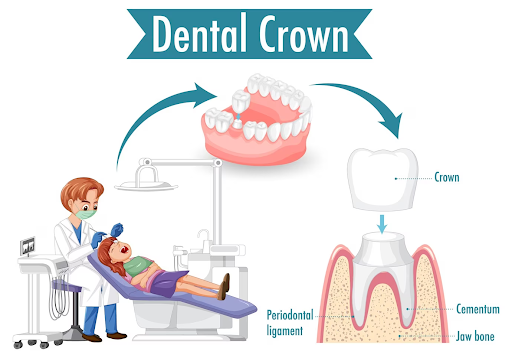
What is a dental crown?
A dental crown is a part of the restoration in which a cap is placed over a damaged or decayed tooth. The dental cap covers the visible part of the tooth, restoring its shape, size, and strength.
Dentists commonly use dental crowns to treat a variety of dental problems. They also protect a weak tooth from breaking, restore a broken or severely decayed tooth, cover a dental implant, or improve its appearance.
The process of getting a dental crown usually involves two visits to the dentist. During the first visit, the dentist will prepare the tooth by removing any decayed or damaged parts and shaping it to make room for the crown.
Then, the dentist will take impressions of the tooth and surrounding teeth to create a mold for the crown. The mold is sent to a dental laboratory where the crown is custom-made to fit your tooth precisely.
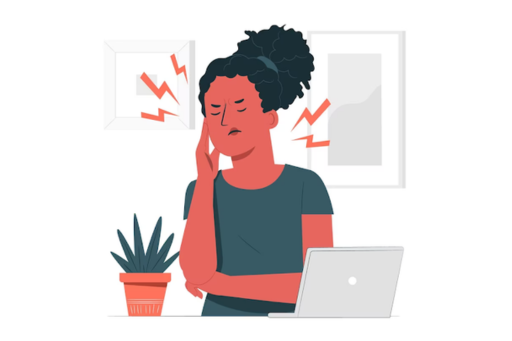
What causes dental crown pain?
There are a lot of reasons why pain in tooth with crown when biting down or why you may experience pain in the tooth after a dental crown procedure. We’ve listed a few below:
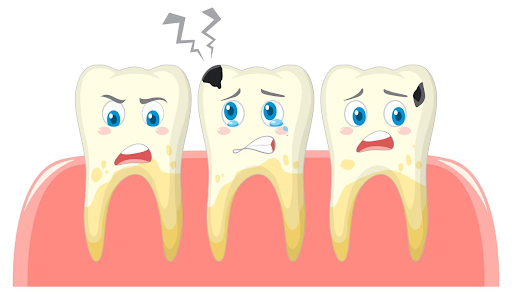
- Tooth decay under the crown
Crown tooth hurts years later because the tooth under the dental crown is still alive. Tooth decay or a new cavity might develop on the edge of the tooth and the crown. This cavity may cause the area to experience pain. You might require a root canal if a tooth cavity gets severe enough to harm the nerve.
- Infection due to tooth crown
The tooth still has nerves in it if you didn’t get a root canal before getting a crown. Sometimes crown puts pressure on the nerve, which results in an infection.
Alternatively, bacteria from old fillings under the crown that leak can cause infections. Infection warning signs include-
- discomfort when chewing
- gum inflammation
- sensitivity
- fever
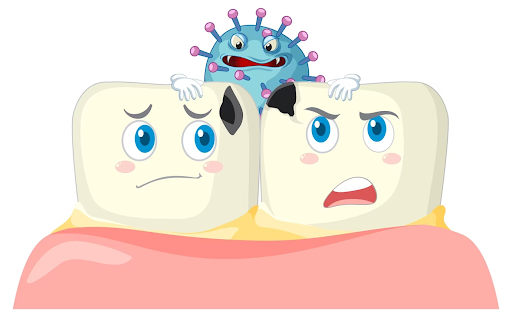
- Sore gums after the procedure
Following the crown implantation operation, you can experience little discomfort. The duration of this discomfort shouldn’t exceed two weeks. If you’re in a lot of pain after getting a crown or if the ache doesn’t go away after two weeks, consult your dentist immediately.
- A tooth or crown fracture
A crown fracture or tooth fracture can cause mild pain. The crack could make you more sensitive to air, heat, or cold. You must have your crown fixed if it is cracked, loose, or broken.
- Bruxism
Also known as teeth grinding, bruxism can result in jaw difficulties, migraines, chipped teeth, and other issues. Knowing the symptoms of bruxism and getting regular dental treatment is crucial since it’s possible to have sleep bruxism without realizing it until difficulties arise.
- Recessed gums
If the gums around your crowned tooth have receded and exposed a portion of the tooth’s root, you can experience discomfort and sensitivity. Harsh brushing can result in gum recession.
Recession makes gums more susceptible to plaque accumulation and diseases.
- Incorrect fitting of a tooth crown
Your crown may feel uncomfortable if it doesn’t fit properly. It could also impact your bite or smile. If you have pain or crown hurts when biting down, the tooth’s crown is likely too high.
How to relieve dental crown pain?
Treatment for tooth pain after crown depends on the reason. However, some simple treatments can help.

- OTC medication
If you have a toothache after crown, over-the-counter (OTC) drugs like ibuprofen (Advil) or acetaminophen (Tylenol) may offer momentary relief.
- Saltwater rinses
By rinsing your mouth with saltwater, you can relieve pain and inflammation. Add 1/2 teaspoon of salt to 8 ounces of water, and stir the mixture for 30 seconds. Rinse mouth with the mixture several times a day.
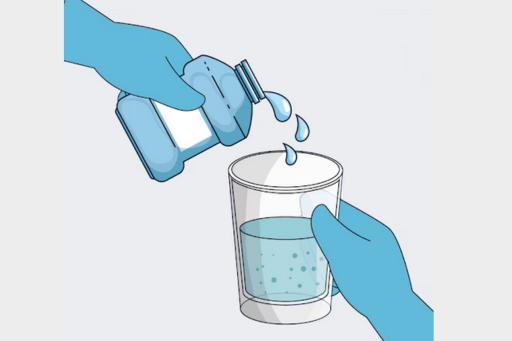
- Herbal remedies
Although the efficacy has not been scientifically verified, some users of herbal medicines claim to experience pain alleviation. Some of these can be used right on the tooth with pain. Herbs that are popular for dental discomfort include:
- clove
- garlic
- turmeric
- ginger
- chamomile
When to consult your dentist?
Consulting with your dentist is necessary to determine whether the pain in your crown needs immediate attention. To relieve your pain, a dentist can quickly fix any issues with your bite or the fit and alignment of your crown.
Extending the crown might be a solution in case of painful receding gums. Dentists may take off the dental crown and perform a root canal if there’s an infection.
Conclusion
Your dental health impacts your overall well-being. Therefore, it is essential to follow dental care tips after a dental crown procedure. Go for regular dental checkups to keep your teeth and gums healthy. Book an appointment with Genuine Dental if you want to consult the best. Experience dental care differently.